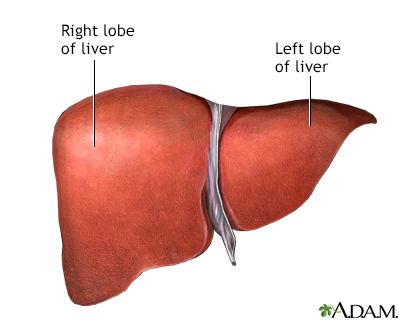Alpha-1 antitrypsin deficiency
Alpha-1 antitrypsin (AAT) deficiency is a condition in which the body does not make enough of AAT, a protein that protects the lungs and liver from damage. The condition can lead to chronic obstructive pulmonary disease (COPD) and liver disease (cirrhosis).
Chronic obstructive pulmonary disease
Chronic obstructive pulmonary disease (COPD) is a common lung disease. Having COPD makes it hard to breathe. There are two main forms of COPD:Chroni...

Cirrhosis
Cirrhosis is scarring of the liver and poor liver function. It is the last stage of chronic liver disease.

Causes
AAT is a type of protein called a protease inhibitor. AAT is made in the liver and it works to protect the lungs and liver.
AAT deficiency means there is not enough of this protein in the body. It is caused by a genetic variant. The condition is most common among Europeans and North Americans of European descent.
Adults with severe AAT deficiency will develop emphysema, sometimes before 40 years of age. Smoking can increase the risk for emphysema and make it occur earlier.
Symptoms
Symptoms may include any of the following:
- Shortness of breath with and without exertion, and other symptoms of COPD
Shortness of breath
Breathing difficulty may involve:Difficult breathing Uncomfortable breathingFeeling like you are not getting enough air
 ImageRead Article Now Book Mark Article
ImageRead Article Now Book Mark Article - Symptoms of liver failure
- Loss of weight without trying
Loss of weight
Unexplained weight loss is a decrease in body weight, when you did not try to lose the weight on your own. Many people gain and lose weight. Uninten...
Read Article Now Book Mark Article - Wheezing
Wheezing
Wheezing is a high-pitched whistling sound during breathing. It occurs when air moves through narrowed breathing tubes in the lungs.
 ImageRead Article Now Book Mark Article
ImageRead Article Now Book Mark Article - Coughing
Exams and Tests
A physical exam may reveal a barrel-shaped chest, wheezing, or decreased breath sounds. The following tests may also help with diagnosis:
- AAT blood test
AAT
Alpha-1 antitrypsin (AAT) is a lab test to measure the amount of AAT in your blood. The test is also done to check for abnormal forms of AAT....
Read Article Now Book Mark Article - Arterial blood gases
Arterial blood gases
Blood gases are a measurement of how much oxygen and carbon dioxide are in your blood. They also determine the acidity (pH) of your blood.
 ImageRead Article Now Book Mark Article
ImageRead Article Now Book Mark Article - Chest x-ray
Chest x-ray
A chest x-ray is an x-ray of the chest, lungs, heart, large arteries, ribs, and diaphragm.
 ImageRead Article Now Book Mark Article
ImageRead Article Now Book Mark Article - CT scan of the chest
CT scan of the chest
A chest CT (computed tomography) scan is an imaging method that uses x-rays to create cross-sectional pictures of the chest and upper abdomen....
 ImageRead Article Now Book Mark Article
ImageRead Article Now Book Mark Article - Genetic testing
- Lung function tests
Lung function tests
Pulmonary function tests are a group of tests that measure breathing and how well the lungs are functioning.
 ImageRead Article Now Book Mark Article
ImageRead Article Now Book Mark Article
Your health care provider may suspect you of having this condition if you develop:
- COPD before age 45
- COPD but you have never smoked or been exposed to toxins
- COPD and you have a family history of the condition
- Cirrhosis and no other cause can be found
- Cirrhosis and you have a family history of liver disease
Treatment
Treatment for AAT deficiency involves replacing the missing AAT protein. The protein is given through a vein each week or every 4 weeks. This is only slightly effective at preventing more lung damage in people without end-stage disease. This procedure is called augmentation therapy.
If you smoke, you need to quit.
To quit
There are many ways to quit smoking. There are also resources to help you. Family members, friends, and co-workers may be supportive. But to be su...

Other treatments are also used for COPD and cirrhosis.
Lung transplant can be used for severe lung disease, and liver transplant can be used for severe cirrhosis.
Outlook (Prognosis)
Some people with this deficiency will not develop liver or lung disease. If you quit smoking, you can slow the progression of the lung disease.
COPD and cirrhosis can be life threatening.
Possible Complications
Complications of AAT deficiency include:
- Bronchiectasis (damage of the large airways)
Bronchiectasis
Bronchiectasis is a disease in which the large airways in the lungs are damaged. This causes the airways to become permanently wider. Bronchiectasis...
 ImageRead Article Now Book Mark Article
ImageRead Article Now Book Mark Article - COPD
- Liver failure or cancer
When to Contact a Medical Professional
Contact your provider if you develop symptoms of AAT deficiency.
Reviewed By
Allen J. Blaivas, DO, Division of Pulmonary, Critical Care, and Sleep Medicine, VA New Jersey Health Care System, Clinical Assistant Professor, Rutgers New Jersey Medical School, East Orange, NJ. Review provided by VeriMed Healthcare Network. Also reviewed by David C. Dugdale, MD, Medical Director, Brenda Conaway, Editorial Director, and the A.D.A.M. Editorial team.
Han MK, Lazarus SC. COPD: diagnosis and management. In: Broaddus VC, Ernst JD, King TE, et al, eds. Murray and Nadel's Textbook of Respiratory Medicine. 7th ed. Philadelphia, PA: Elsevier; 2022:chap 64.
Masson VK, Boas SR. a1 -antitrypsin deficiency and emphysema. In: Kliegman RM, St. Geme JW, Blum NJ, et al, eds. Nelson Textbook of Pediatrics. 22nd ed. Philadelphia, PA: Elsevier; 2025:chap 442.
Tejwani V, Stoller JK. The spectrum of clinical sequelae associated with alpha-1 antitrypsin deficiency. Ther Adv Chronic Dis. 2021;12_suppl. PMID: 34408829 pubmed.ncbi.nlm.nih.gov/34408829/.


 All rights reserved.
All rights reserved.